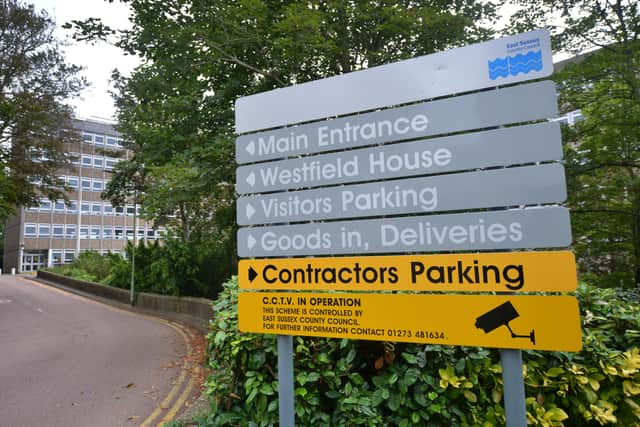This is where almost £9million will be spent on improving roads and climate change action in East Sussex
and live on Freeview channel 276
On Tuesday (November 9), East Sussex County Council’s cabinet considered proposals on how the authority should spend the £8.855m set aside earlier this year, as a result of the coronavirus pandemic and additional government funding.
Cabinet members agreed two proposals; spending £5.8m on highways repairs and spending £3.055m on a series of projects connected to the council’s climate emergency action plan in 2022/23 and 2023/24.
Climate change actions


Advertisement
Hide AdAdvertisement
Hide AdThe council also intends to spend £812,000 on these climate projects in this financial year, with funding to be drawn from existing budgets.
Conservative cabinet member for resources and climate change Nick Bennett said: “This authority has made strong progress in cutting our own carbon emissions and the proposals in this report aim to build on existing capacity and enable projects to assist the council to mainstream its action on climate change.”
The largest of these environmental investments, slated to cost more than £2.5m over the next three years, would be in a programme to decarbonise heating in a number of council-owned buildings.
This would involve energy efficiency improvements, such as better insulation and replacement boilers, and be expected to save the council around £155,000 per year in heating costs and cut its carbon emissions by approximately 255 tonnes per year.
Advertisement
Hide AdAdvertisement
Hide AdOther carbon-cutting building projects would also see investment, including the installation of low energy lighting and solar panels in a number of schools and other council-owned buildings.
Money would also be spent on modelling on how the council could get to net zero carbon emissions. This would look at the potential costs, benefits, risks and timescales of a number of different approaches.
‘Miles Better’ programme
The remaining £5.8m one-off highways investment would be used to repair pavements, fill in potholes and improve road signs and markings around the county.
The highways improvement programme, named ‘Miles Better’ will see £2.5m for extra patching work on road surfaces, £1.8m to improve pavements, £500,000 to refresh lines and road markings and £1m to replace and update road signs.
Advertisement
Hide AdAdvertisement
Hide AdClaire Dowling, cabinet member for transport and environment, said: “Every person who lives, works or visits East Sussex uses our network, whether they are walking and cycling, using public transport or driving.
“Improving the network will encourage more walking, more cycling and will help encourage less use of vehicles.”
She added: “I’m very pleased we’ve actually got this money. It is one-off money but it is very important, because most of our mail bags are full of the issues this money will help to improve.”
Questions around effectiveness of spending
While the investment was broadly welcomed, there were some concerns among opposition councillors about whether the funding could be spent more effectively.
Advertisement
Hide AdAdvertisement
Hide AdFor example, Cllr Stephen Shing, of the Wealden Independents, raised concerns about the cost versus saving of installing new boilers in council buildings.
The council’s Green group said the council could have pursued match-funding on green energy schemes, arguing this would have seen a greater number of projects for the same amount of spending.
They also called for local modelling on what damage climate change could bring to East Sussex.
Labour councillors questioned why the majority of funding was going to highways, rather than being split equally across the two areas.
Advertisement
Hide AdAdvertisement
Hide AdThe Liberal Democrats group meanwhile raised concerns about whether more investment and action was needed to tackle the authority’s Scope 3 emissions, those being indirect emissions generated by the council’s contractors and supply chain.
The Lib Dems also argued other council activities should have also seen funding.
Lib Dem climate change spokesman Colin Swansborough said: “So we’ve got this windfall of £8.5m, which has been floating around the chamber for the last few months. We were all fascinated to see how it was going to be spent.
“I was surprised there were only two allocations for it when we looked at the budget this year and again when we looked at this £8.5m somewhere in June/July, we had proposals for some other headings which we thought might have caught attention and might have been able to attract some funding.
Advertisement
Hide AdAdvertisement
Hide Ad“One of the things we were concerned about was children’s mental health. I would suggest that hasn’t gone away, so I am disappointed to see no money has been allocated to that.
“We were also concerned about respite services and we were concerned, amongst other things about Special Educational Needs (SEN). We allocated some of the funding that we considered might have been available to those headings.
“I’m still surprised you haven’t found any money for those subjects, which I think is quite shameful really.”
‘This is one-off funding’
These arguments saw some pushback from Conservative cabinet members, however.
Advertisement
Hide AdAdvertisement
Hide AdBob Standley, cabinet member for education, said: “I think there is a danger here that we are forgetting this is one-off funding.
“We’ve had a number of speeches here this morning about adding things, but nobody is actually saying what it is they are going to take out.”
He added: “Short term fixes for SEN is not the way to go; we need long term fixes.
“The government in the budget have increased money for eduction and for SEN. Just putting in a one-off figure, which then disappears after a year is not the way to fund an important subject like that in the long term.”
Cllr Bennett, meanwhile, argued that highways and climate action were the areas in which residents had expressed the most support for investment.